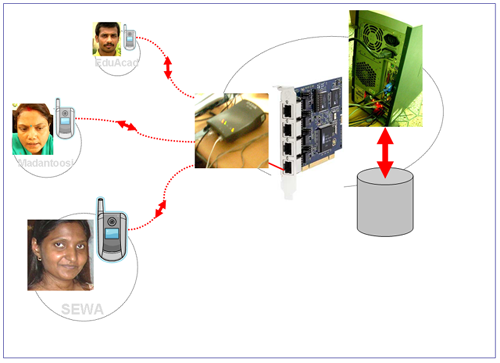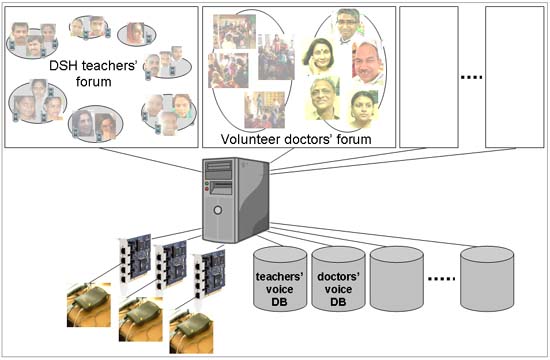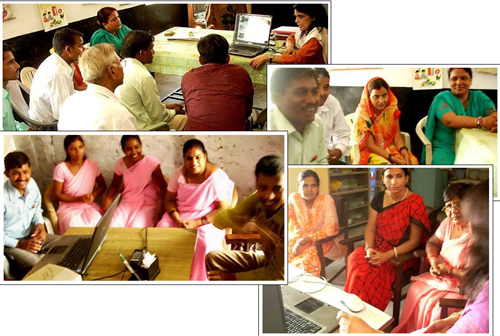The DSH Voice Forum: The Technology
We discuss three technical aspects of the voice forum that we think are interesting. First is its "edge-only" light-weight implementation. Traditionally, such an application is typically developed with expensive proprietary PBX equipment and software, often in conjunction with carriers. Such an approach is costly, difficult to customize, and difficult to justify for very small groups of users. Our system is built on top of cheap ISDN line cards plugged into conventional PCs and the open-source Asterisk framework. (The voice servers simply sit in our regional offices.) The decentralized development and deployment is low-cost, provides extreme ease of customization, makes it feasible for us to experiment with tailor-made solutions for small groups of teachers.

The second innovation is its interface. We were forced to conclude that a traditional hierarchical voice menu wouldn't work--if it's not something that our teachers feel comfortable with, they simply wouldn't use it. After much experimentation, we have settled on a simple menu-less interface: during each call, a teacher gets to hear a message and at the end of it, optionally gets to record a message of her own. That's it! The voice server, however, gets to do something clever during a call. Because the server "knows" who the user is and her entire call history, the server gets to "guess" the "best" message to play at this moment for this user. (As an obvious example, if a teacher has recorded a message of her own earlier and someone else has later recorded a followup reply, that followup gets played to the first teacher when she visits the voice forum again.) There's a whole series of heuristic rules that the voice server employs to decide what messages to play. In a sense, the interface "intelligence" is moved into the "cloud," where far richer data is available to enable good decisions; the result is something that's both extremely simple to use and relevant to callers and listeners.

The third interesting aspect is the way the voice forum integrates with the Internet. The voice servers housed at individual regional offices communicate with each other to form a network of voice servers. While our teachers at the remote schools exclusively access the voice forum with simple voice phones, other users (including staff, more sophisticated teachers in urban schools, and education experts and partners) get to access the voice forum through a web interface served by one of these voice servers. For example, our collaborators at the education schools of University of Washington Seattle and University of California Berkeley access the forum via a US-based voice server. After browsing or searching the incoming messages, a US-based collaborator can easily use the built-in VOIP features to send a message to either a specific Indian village teacher or a group of teachers. Therefore, the voice forum is a "hybrid network" that, irrespective of the technologies people use to access it, allows everyone to share and contribute equally.

A key theme of all the undertakings of DSH is cost-effectiveness: we work on ideas that utilize practical and cheap technology components so there's hope of large-scale deployment. In the case of the proposed voice forum, we do not demand that users possess smart phones; "dumb" voice phones would do and our target audience already have them. (For those who don't, as discussed earlier, we are distributing shared "phone-radio boxes.") The only question is how to make the "dumb" devices that people already have do more interesting things. The "intelligence" of the system is implemented in the voice servers. So the proposed voice forum does not require a massive investment in new end-user devices.
For more details, here is a recording of a talk on the voice forum and here is the slides of the talk. Here's a write-up.